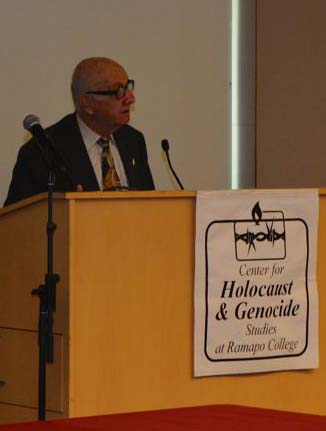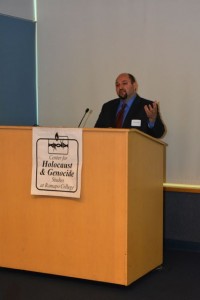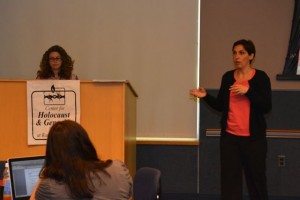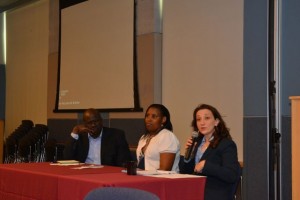- About Ramapo
- Academics
- Admissions & Aid
- Student Life
- Athletics
- Alumni
- Arts & Community
- Quick Links
- Apply
- Visit
- Give
2013 Gumpert Teachers’ Workshop
(PDF) (DOC) (JPG)May 17, 2013

Dr. Paul Winkler
(MAHWAH, NJ) – On May 17, 2013, the Center for Holocaust and Genocide Studies sponsored a Gumpert Teachers’ Workshop, “American Silence in the Age of Genocide; From the Armenian Genocide to Darfur.” Held at Ramapo College, it was attended by 68 educators from throughout New Jersey. The New Jersey State Commission on Holocaust Education and the Gumpert Foundation supported it.
As noted in Center Director Michael Riff’s welcoming remarks, because it dealt with U.S. Government policy and public involvement, the workshop would likely touch some raw nerves. However, he hoped that a positive discourse would result would emerge during Q&A, which it did.
In speaking on behalf of the New Jersey Commission on Holocaust Education, Executive Director Dr. Paul Winkler emphasized that teaching about the tensions between private engagement, public activism and government policy would open up classroom discussion about the role of the citizen in a free society, individual responsibility, and the evolution of public policy on genocide and human rights.
Michael Bobelian, the author of Children of Armenia: A Forgotten Genocide and the Century-Long Struggle for Justice, published by Simon & Schuster in 2009, delivered the keynote lecture to introduce the topic. Chronicling the U.S. involvement with the Armenian Genocide, he explained how and why from the outset the sympathies of the American people were with the victims, and there was no doubt about who was responsible. U.S. Ambassador to the Ottoman Empire Henry Morgenthau and other American diplomats as well as missionaries reported extensively on what they saw and heard on the ground. Thanks to the reports of the New York Times and other newspapers, the American people were fully informed about the unfolding tragedy of what was befalling the Armenians of Ottoman Turkey.
Public support was mobilized and a massive fundraising effort was undertaken that spawned an extensive relief effort in the countries to which Armenian survivors were driven or fled. However, a pattern of inaction in the face of Turkish intransigence and geopolitical priorities developed when the Republic of Turkey’s increasingly important role as the gateway to the Middle East took precedence over the pursuit of justice. Over the years, realpolitik triumphed and philanthropic efforts assuaged popular guilt.

Michael Bobelian, Esq.
As Bobelian demonstrated, a paradigm was established for the U.S. response to genocide that has lasted to the present day. Whether it was the initial persecution of the Jews in Germany or the still unfolding tragedy in the Darfur region of Sudan, public sentiment and pressure for U.S. action outpaced government support. As in the case of the Armenian Genocide, successive U.S. administrations have chosen geopolitical “pragmatism” over humanitarian intervention or human rights.
For the Armenian survivors of the Genocide, Bobelian emphasized, restarting their shattered lives was the order of the day. Lobbying the American or other governments to pressure the Turkish authorities to acknowledge the Genocide, punish the perpetrators or agree to pay reparations was not really on their agenda. They wanted to establish families, re-build their livelihoods, and revive communal life. They swallowed the pain of losing family and friends as well as property. Not even their children heard the horrors they experienced.
According to Bobelian, it was only on the 50th anniversary of the Armenian Genocide, in 1965, that there was achange in this response, which was also in part encouraged by the growing attention being paid to the Holocaust in the media following the Eichmann Trial of 1961. However, even the support of Senate GOP leader Bob Dole and a succession of political candidates failed to budge the U.S. Government’s position of favoring Turkish over Armenian concerns that the Truman administration inaugurated in the wake of the Cold War. Successive attempts to reverse the policies have met with severe resistance not only from the foreign policy and defense circles within government, but also from industry and trade interests doing business with Turkey.
In Bobelian’s view, Turkish intransigence on the Armenian Genocide remains steadfast, and only shows a likelihood of relenting under the impact of pressure within Turkey itself. On the other hand, he added, he is encouraged by the increasing courage of the younger generation of historians and activists, some of whom are of Armenian and Kurdish origin, to champion historical truth and challenge the status quo..
A frequent contributor on legal affairs to Forbes.com, Michael Bobelian is an author, lawyer, and journalist whose work also covers issues ranging from corporate wrongdoing to human rights. He has also written for Legal Affairs Magazine, the Washington Monthly, and the New York Law Journal, where he worked as staff reporter. Michael’s media appearances include C-Span’s “BookTV”, NPR’s “Word of Mouth,” and NPR’s “Leonard Lopate Show.”
Upon graduating from the University of Michigan’s Business and Law Schools, Michael worked at the law firm of Hughes Hubbard & Reed before earning a Master’s degree from the Columbia University Graduate School of Journalism.

(Left to Right) Lindsay Warren and Dr. Ann Mahon
Following Bobelian was a presentation by Hunterdon Central High School High School teachers Dr. Ann Mahon and Lindsay Warren on “How Should Genocide be Remembered: A Pedagogical Approach.” It provided a roadmap for teachers and students to analyze and assess how the U.S. and the international community have confronted the issues of genocide, other mass killings and human rights violations on the basis of monument and museum design. In the process, Mahon and Warren put forward a number of essential questions to be raised with students:
- What does it mean to remember?
- How do people remember?
- How does memory impact the future?
- It is important to remember?
- How does one memorialize a delicate topic? Does it change the process?
- How do different cultures remember?
- How do you remember?
Following a break for lunch, a panel of two survivors of the Rwandan and Darfur genocides and a descendant of the Armenian Genocide convened to reflect on the impact on their communities of how the U.S. and the world community have confronted the issue of genocide. The first to speak was Center for Holocaust and Genocide Studies Advisory Board member and Armenian National Committee activist Ani Tchaghlasian. Echoing a number of the points made by Michael Bobelian, the thrust of her remarks centered on the impact of the culture of denial still the norm in Turkey. She made a particular point of emphasizing how the Turkish government has never relented in trying to influence the U.S. political and academic communities.

(Left to Right) Ahmed H. Adam,
Eugenie Mukeshimana and Ani Tchaghlasian
Eugenie Mukeshimana, who founded and now serves as Executive Director of the Genocide Survivors Support Network and who participated in last year’s workshop on transitional justice, spoke next. She emphasized that closure still remains elusive for many of the Rwandan Genocide’s victims. They still live in fear and find it difficult to continue as if nothing had ever happened. They often also continue to be afraid of their former tormenters. In her view, Rwandan society has to understand that it has been irrevocably damaged, which can only begin to be achieved through education. She also emphasized the necessity of regarding genocide as a living concern and not solely as a matter for historical inquiry.
The last panel member to speak was Ahmed Hussain Adam, Visiting Scholar and Co-Chair of the Two Sudans Forum at the Institute for the Study of Human Rights (ISHR), Columbia University. The thrust of his remarks was that, far from abating, the genocide in Darfur has spread to other regions of Sudan. In the process, the country’s leadership under Omar al-Bashir has lost its moral authority and legitimacy. His assessment is that the Bashir regime has created too many crises and inconsistencies to be sustainable over the long haul. He believes that it is incumbent on the U.S. and other key players in the international community, especially the African Union, to facilitate a transition in Sudan. The American advocacy community, he emphasized, has a key role to play in this development by being potentially able to shape opinion within Obama administration.
As has been the case in the past, a lively and well-informed discussion ensued. In their evaluations, workshop participants heaped praise on the presentations for their high quality and informative nature.
E-News Archives
| 2023 | 2022 | 2021 | 2019 | 2018 | 2017 | 2016 | 2015 | 2014 | 2013 | 2012 | 2011 | 2010 | 2009 | 2008 | 2007 |Copyright ©2025 Ramapo College Of New Jersey. Statements And Policies. Contact Webmaster.

Follow Us!